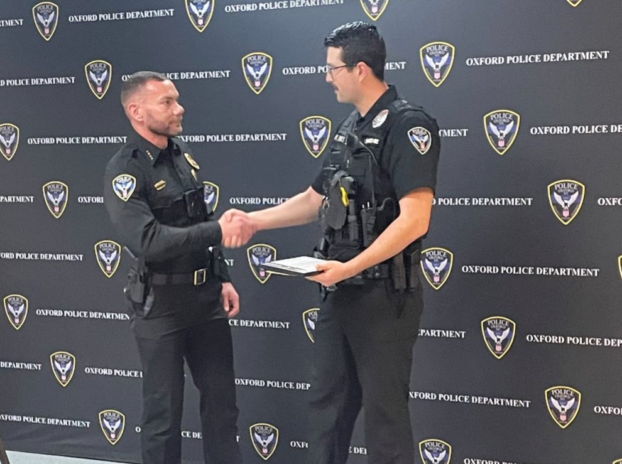Sponsored Content
Oxford police officer recognized for saving suicidal individual
Published 12:36 pm Friday, January 26, 2024

- OPD Chief Jeff McCutchen, left, congratulates Officer Ramon Sones for earning the Life Saving Award. Photo by Alyssa Schnugg
Officer Roman Sones was on his lunch break when he heard a call come over the radio from dispatch on Dec. 19 about a possible suicide attempt at the downtown parking garage.
Despite not being a patrol officer, Sones knew he was close by and headed to the garage.

MDMH director Wendy Bailey presented Sones with a Certificate of Appreciation Friday. Photo by Alyssa Schnugg
“That is the heart of first responders and being committed to caring about people,” said Oxford Police Chief Jeff McCutchen about Sones. “He saw a need, he responded. And he met a need and he loved on a person and gave them a chance, and they’re still with us today because of what he did.”
Trending
Using the skills he learned at the Crisis Intervention Team training he received from Communicare, Sones spent about 20 minutes talking to the despondent individual.
The two eventually walked down from the top level of the garage to a waiting ambulance on the ground floor.
“It was beautiful,” McCutchen said. “It was just a great picture of what can happen when our first responders and police work with our community assets in mental health.”
Sones was recognized for his life-saving efforts on Friday by the Oxford Police Department, receiving a Life Saver Award, and by the Mississippi Department of Mental Health, which presented Sones with a certificate of appreciation for his extraordinary life-saving and decisive actions.
“We wanted to come today to honor (Sones) and to recognize a partnership because there’s a person alive today – there’s a life saved because of you and because of a partnership that consists at the state level and the local level with Communicare, who has made it a priority to train officers and the Oxford Police Department that has made it a priority for their officers to be trained in crisis intervention team training,” said Wendy Bailey, executive director of the MDMH at the ceremony.
Sones has been with the OPD for a little over a year. He came to Oxford from Columbus where he was a police officer since 2014. He said he decided to become an officer because he wanted to help people.
Trending
The Crisis Intervention teams are the product of a partnership between local law enforcement officers and a variety of agencies, including Community Mental Health Centers, primary health providers and behavioral health professionals. In Oxford, that partner is Communicare, which provides the training to area law enforcement officers.
These techniques help law enforcement officers de-escalate potentially dangerous situations with someone experiencing a crisis. Officers learn how to calmly and compassionately work with people who may be dealing with mental health issues.
Sones said he was thankful to Communicare for providing the CTI training class – a 40-hour course – and the OPD for encouraging all officers to complete the training.
“When I first became an officer in 2014, this type of training wasn’t available,” he said. “Because of the hard work Communicare does and the training they give, and how much they reach out to the community – not only to intervene in the moment but to follow up after to give them the treatment they need to actually improve … this wouldn’t have been possible without those people (Communicare) … I’m very thankful for my department (OPD) and my administration for pushing us to get this training so we can focus on saving lives — not necessarily in a traditional police sense but in a mental health issue which is becoming probably the largest problem affecting our community.”
Communicare Executive Director Melody Madaris said OPD and the Lafayette County Sheriff’s Department are both very supportive and involved in the CIT training program. The training is offered about every quarter for 12-16 officers at a time.
“We start out with just a huge dump of mental health information so they can see what this looks like in real life,” she said. “They learn that maybe if someone is acting odd it isn’t necessarily that they’re hiding something, they’re just having a mental health crisis.”
The training offers officers a chance to take part in different scenarios based on real life incidents where they learn de-escalation skills. Officers learn how to calmly and compassionately work with people who may be dealing with mental health issues.
Officers who have received crisis intervention training respond to individuals experiencing a mental health crisis and divert them to an appropriate setting to provide treatment, ensuring individuals are not arrested and taken to jail due to the symptoms of their illness.

